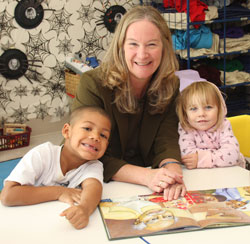 |
|||
| Social Work Home | News | Calendar | Make a Gift | UW Alumni | |||
|
February 2010 | Return to issue home
Meet Ruthann Howell, MSW '83
Q. What attracted you to social work? Additionally, especially when I was at the School, the admin track was focused on community organizing which had great appeal to me, since it was my desire to change the lives of children—particularly kids who had been abused—and the systems that did not seem as responsive to children and families as I thought they should be. So the combination of being able to make a real difference in the lives of kids, and to ultimately be able to change the social fabric of our world through systems change, led me to social work. Q. How has your UW SSW education shaped your career path? The other benefit was having people who knew what I was capable of and who could provide guidance and references for me when I was starting my own professional career after graduate school. The most lucky thing about all of it is that many of the people I met through my practicum, for example Rita Ryder at The YWCA, have become close professional and personal friends, so I continue to benefit from my time at the UW School of Social Work! Q. How has the profession changed in the last 20 years? I see this as an extension of doing what social workers are already good at—building relationships with integrity—which is the major skill set required in cultivation and stewardship. Additionally, the recognition that running a not-for-profit is running a business (indeed the not-for-profit sector is a vibrant economic engine in our community), and that utilizing best business practices are not antithetical to a nonprofit mission, but rather enhances the ability to achieve a mission, is one of the other big changes I have seen since graduate school. Q. What advice would you give to students at SSW? I have been very lucky in the number of people who have invested in me and my professional development (and still do), and have felt called to each position I have held. It seems that when it was time to do something new, doors were open to me and I was fortunate to have the opportunity to be able to enter through some of them. Definitely take advantage of any internship or practicum you can since building that experience is critical to your career development. There are a lot of people out there with degrees so it is important to be able to demonstrate that you can do something and bring value to the organization. Plus, strategically, it builds references for you. Also be sure to learn from the other students. My class was rich with people who had amazing experience already and insights. And some of those classmates have become lifelong friends—another bonus! I will also tell you that while agencies like ours look for a certain level of competency or credentialing, we also look for people who want to be part of changing the world through our work with children and families, and who are more focused on achieving the goals we have laid out for ourselves than who gets the credit. So the characteristics you bring to the table are equally important. (I also find having a sense of humor and being able to laugh at yourself helps a lot in our work!) February 2010 | Return to issue home | |||
|
|||
